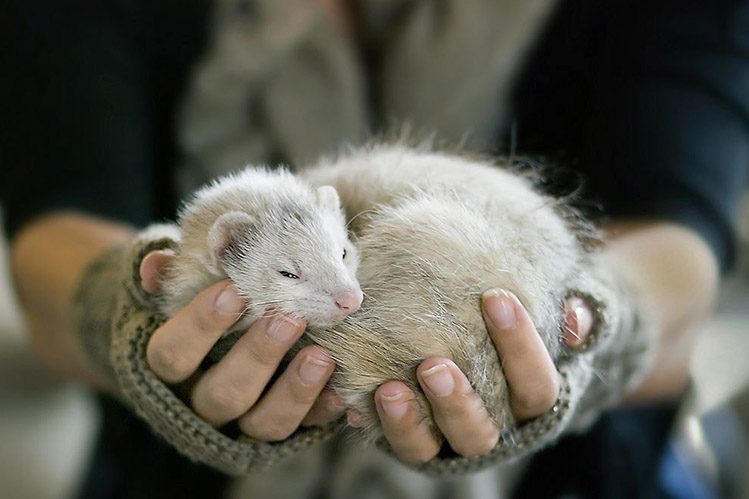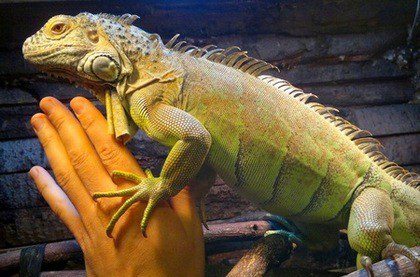
Ferret diseases
Ferrets are naturally healthy and, with proper care, almost never get sick. However, if the pet falls ill, then the disease, as a rule, develops rapidly and, without appropriate treatment, can lead to the most sad consequences, even death, in a short time. The fact is that ferrets have a faster metabolism than dogs and cats. This feature of the body should be taken into account and if you suspect any ailment, contact a good veterinarian in a timely manner.
Ferret diseases
So what diseases can occur in ferrets? The most dangerous infectious diseases are considered rabies, canine distemper, Aleutian mink disease, adenovirus (viral hepatitis), parvovirus enteritisand flu. Yes, the real human flu! Surprisingly, ferrets are the only animals in the world for which this disease is dangerous, other animals cannot become infected with it.
Other contagious diseases that ferrets can get are toxoplasmosis, giardiasis, salmonellosis (paratyphoid), helicobacteriosis (stomach ulcer), escherichiosis (bacterial diarrhea), demodicosis etc. Quite frequent in veterinary practice in dealing with infection helminths, fleas (afonepterosis), withers and other ectoparasites.
Of the most common non-communicable diseases, it is worth mentioning urethritis, urolithiasis, gastroenterocolitis and other digestive problems stomatitis, tartar formation, lung diseases (pneumonia, edema), anemia, congestive cardiomyopathy, dermatitis, various injuries – and this is not even a third of the diseases characteristic of ferrets.

Disease Prevention
In a word, the list is quite long, but you should not be afraid. With the right maintenance, ferret owners rarely have to deal with serious problems. The main thing is to follow the most important recommendations that will help to minimize the likelihood of developing diseases. Here are the recommendations.
Purchase only special high-quality balanced food for your pet. The diet should not contain any foods that are not suitable for a ferret and human delicacies from the table, otherwise your desire to pamper your pet can turn into serious health problems.
Do regular home checkups. This will help to modernly notice the first signs of malaise and take the necessary measures.
Visit the veterinarian at least once a year, even if the pet looks absolutely healthy and happy. Regular preventive examinations by a doctor are one of the foundations of your pet’s good health.
Ferrets need annual vaccinations against diseases such as canine distemper, rabies, parvovirus enteritis, etc. These are very serious diseases that are easier to prevent than cure, because. their treatment is associated with a number of difficulties. Unfortunately, without timely vaccination, a ferret can “catch” this trouble at any time, even if it does not go outside and does not come into contact with other animals. After all, the virus can be brought into the house on outerwear or shoes of family members or guests.
Ferrets not involved in breeding must be castrated (sterilized). And it’s not just about comfortable living together with your pet under the same roof. Castration (and sterilization) is also needed so that the pet does not have health problems. For example, a female ferret in the absence of mating is at risk for the development of aplastic anemia and hyperestrogenism.
Symptoms of diseases
Now we know that if a pet is sick, it is very important to consult a veterinarian in a timely manner. But how can you tell if a ferret is not feeling well? For experienced owners, the answer to this question will not be difficult, but many beginners have little idea of what kind of ferret behavior is normal.
As a rule, when certain diseases occur in a ferret, behavior changes dramatically, appetite disappears, and activity decreases significantly. Difficulty breathing, sneezing and coughing, weakness and lameness, hair loss, irritation and sores on the skin, itching, nausea and stool disturbance, sudden weight loss or weight gain, changes in body shape, convulsions, etc.
As you can see, some symptoms are simply impossible not to notice. However, lethargic behavior, such as refusal to eat and sudden displays of aggression, can also be the primary symptoms of a serious illness, but the novice hobbyist may ignore them for a long time.
Carefully monitor the behavior and well-being of your pet, study and understand it, and in case of any deviations from the norm, always keep your finger on the pulse.
Take care of your pets and good health to you!






